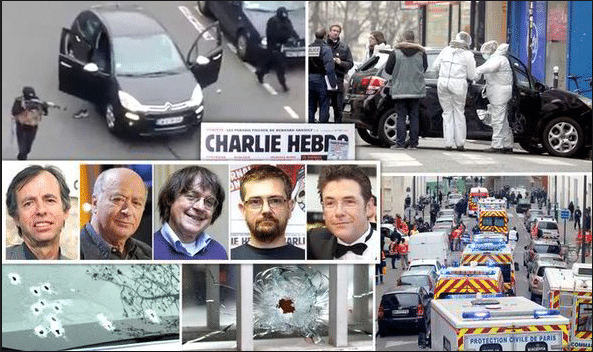Five years ago, Islamists attacked the offices of Charlie Hebdo, a satirical French magazine. They did so to avenge its publication of plainly offensive cartoons of the Prophet Muhammad. They not only killed 12 people in that attack, including five famous cartoonists, but executed “a wave of jihadist strikes across France.”
I duly commented in “Avenging Jihadists Attack ‘Charlie Hebdo’,” January 8, 2015. It includes this excerpt:
________
I am on record defending freedom of expression – even when that expression offended the sense and sensibilities of Muslim Jihadists. …
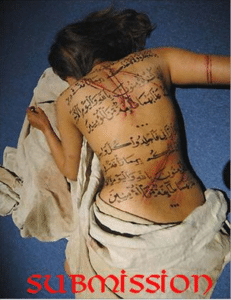 [But] it’s one thing to expose human rights and other abuses, which even so-called moderate Muslims commit in the name of Islam. This is what Hirsi Ali did with her critically acclaimed film, Submission. It’s quite another to willfully insult Muslims with caricatures of the Prophet Muhammad. This is what Charlie Hebdo did with their incendiary cartoons. …
[But] it’s one thing to expose human rights and other abuses, which even so-called moderate Muslims commit in the name of Islam. This is what Hirsi Ali did with her critically acclaimed film, Submission. It’s quite another to willfully insult Muslims with caricatures of the Prophet Muhammad. This is what Charlie Hebdo did with their incendiary cartoons. …
Therefore, those declaring unqualified solidarity with these cartoonists might want to consider how liable they are to charges of brazen hypocrisy. This applies especially to student activists – who are enforcing politically correct litmus tests on guest speakers at their respective campuses.
Freedom of expression gives one the right to offend. But prevailing standards of decency and respect have always put generally accepted limits on that right.
________
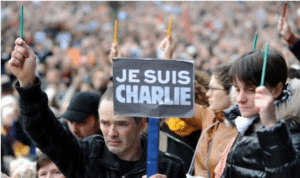 People worldwide were outraged – not at the offensive religious cartoons but at the reflexive religious attacks they triggered. Tens of millions marched in the streets or joined viral protests online to express solidarity with the victims – all under the banner, “Je suis Charlie” (I am Charlie).
People worldwide were outraged – not at the offensive religious cartoons but at the reflexive religious attacks they triggered. Tens of millions marched in the streets or joined viral protests online to express solidarity with the victims – all under the banner, “Je suis Charlie” (I am Charlie).
But I was not among them. To be sure, I condemned the attacks. However, I chose to express solidarity with the hundreds of millions of Muslims who Charlie Hebdo offended so wantonly. In doing so, I was among relatively few who dared to protest under the banner, “Je Ne Suis Pas Charlie” (I am not Charlie).
I duly commented in “Je Ne Suis Pas Charlie,” January 14, 2015. It includes this excerpt:
_________
I am proud to be among the few still small voices condemning instead of praising Charlie Hebdo. But nobody in his right mind could possibly think that committing mass murder against its staff was the right way to express this condemnation. …
I see little difference between Charlie Hebdo publishing anti-Muslim and anti-Semitic cartoons and the KKK publishing racist … and anti-Semitic propaganda. They both peddle hate speech that offends all reasonable notions of free speech. …
 [A]rt historians are declaiming that there’s nothing wrong with Charlie Hebdo publishing images of the Prophet Muhammad. After all, they argue, images of the Prophet appear in medieval Islamic art. But this is plainly specious. After all, I argue, medieval Islamic art invariably depicts respectful and reverential images of the Prophet, whereas Charlie Hebdo invariably publishes demeaning and defiling ones.
[A]rt historians are declaiming that there’s nothing wrong with Charlie Hebdo publishing images of the Prophet Muhammad. After all, they argue, images of the Prophet appear in medieval Islamic art. But this is plainly specious. After all, I argue, medieval Islamic art invariably depicts respectful and reverential images of the Prophet, whereas Charlie Hebdo invariably publishes demeaning and defiling ones.
What’s more, non-Muslims telling Muslims what should not cause them religious offense reeks of the kind of paternalistic arrogance that once had whites telling Blacks what should not cause them racial offense. …
Finally, there’s this: On the one hand, Westerners are implementing all kinds of police-state measures to prevent ‘lone wolf’ attacks. On the other hand, they are leading mass parades in support of anti-Muslim cartoons, which will likely do more than jihadist propaganda to incite and recruit Muslims to carry out such attacks. Am I the only one who sees the self-defeating irony inherent in this?
________
My allusion to the KKK is not without context. Because this is the same Charlie Hebdo that caricatured Christiane Taubira, France’s former black and female justice minister, as a monkey. Its editors explained that they were using this racist caricature to condemn the racism that animates supporters of France’s far-right. But that was and remains too fatuous for comment.
Besides, nothing vindicates the stand I took on this tragedy quite like Charlie Hebdo choosing this week to republish those cartoons of the Prophet Muhammad. Here is how its editors are explaining their decision to taunt Muslims with religious insults again:
In its editorial, the magazine says that it has often been asked to carry on printing caricatures of the prophet since the 2015 killings.
‘We have always refused to do so, not because it is prohibited – the law allows us to do so – but because there was a need for a good reason to do it, a reason which has meaning and which brings something to the debate,’ it says.
‘To reproduce these cartoons in the week the trial over the January 2015 terrorist attacks opens seemed essential to us.’
(BBC, September 1, 2020)
It might be helpful to remember that French police hunted down and killed the two Islamists who executed the attacks. This long-awaited trial is of their 14 accomplices.
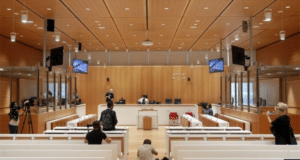 Except that Charlie Hebdo would be hard-pressed to explain why this trial constitutes “a good reason” to republish these cartoons. After all, any reasonable person knows that the courtroom is the place for the production of evidence.
Except that Charlie Hebdo would be hard-pressed to explain why this trial constitutes “a good reason” to republish these cartoons. After all, any reasonable person knows that the courtroom is the place for the production of evidence.
This is why doing so can appeal only to hypocritical dullards; namely the very people Charlie Hebdo claims it has continually refused to humor since those fateful attacks.
That said, you might think the stand I took lacked religious or political authority. Therefore, I shall end by noting that, within a week, both Pope Francis and then French Prime Minister Manuel Valls were among the principled few who stood with me. I cited their solidarity in “Pope Francis Rebukes ‘Charlie Hebdo’,” January 15, 2015. It includes this excerpt:
________
From day one, I seemed to be among far too few non-Muslims condemning Charlie Hebdo for publishing anti-Muslim cartoons.
Imagine my feeling of solidarity, therefore, when Pope Francis affirmed our condemnation — not only of mass murder in the name of religion, but also of religious insult in the name of freedom of speech.
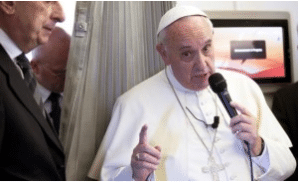 Here in part is what he pronounced just hours ago:
Here in part is what he pronounced just hours ago:
To kill in the name of God is an aberration.
[However], if [a close friend] says a swear word against my mother, he’s going to get a punch in the nose. One cannot provoke, one cannot insult other people’s faith, one cannot make fun of faith.
(TIME, January 15, 2015)
Those who took exception to my criticism of the “Je Suis Charlie” rallying cry also took exception to my warnings about feelings of disenfranchisement, disillusionment, and disaffection among Muslim youth, which lead inevitably to anger, rage, and pathological violence. I originally issued warnings in this respect in “Caricatures of the Prophet Muhammad Incite Fiery Rage, Part II,” February 6, 2006, and again, most recently, in “Massacre in Paris: Islamic Jihadists Come Home to Roost,” January 7, 2015.
So imagine my feeling of vindication when French Prime Minister Manuel Valls echoed my warnings. For here in part is what he admitted during a speech today before the National Assembly in Paris:
We have to look at all the divisions, the tensions that have been going on for years … the neglect of the suburbs, the ghettos, the social misery…
A geographical, social and ethnic apartheid has established itself in our country.
(Reuters, January 20, 2015)
I rest my case.
________
The trial of these accomplices might have inspired Charlie Hebdo to add salt to this still festering wound. I couldn’t care less about their fate.
But, whatever you think of my stand, you cannot deny the authoritative support the admonitions of Pope Francis and Prime Minister Valls provide. Still, here’s my closing statement:
- If cartoonists publish images of Martin Luther King Jr. looking like a big black sambo munching on watermelon, would you stand in solidarity with them?
I rest my case … again.
Related commentaries:
avenging Jihadists… I am not Charlie… Pope rebukes…
